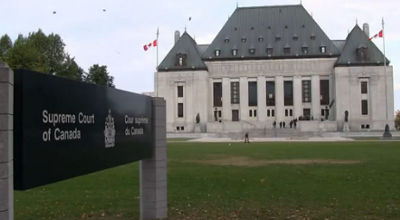On Wednesday morning the Supreme Court of Canada (SCC) released a unanimous decision in the Saskatchewan Human Rights Commission v. William Whatcott case, which challenged the right to expression of religious comment, however controversial and unpopular, in public policy dialogue.
“The SCC seized this opportunity to clarify and narrow the understanding of ‘hate speech’ as set out in its 1990 decision in the Taylor case,” explains Don Hutchinson, vice president and general legal counsel with The Evangelical Fellowship of Canada, an intervener in the case. “In doing so the court affirmed that Supreme Court of Canada precedent, even a 4-3 split from 20 years ago, remains binding law in Canada. This is vital to the stability of Canadian law.
“To clarify the objective understanding of hate speech, the court struck out terms used in the hate speech provision in the Saskatchewan Human Rights Code (Code) that concerned something more akin to hurt feelings,” Hutchinson continues. “The standard is clearer, from the legal perspective, that speech may only be deemed hateful when assessed to be so objectively from the perspective of a reasonable person, with full consideration of the circumstances, and when the expression is likely to expose a person to detestation and vilification on the basis of prohibited grounds of discrimination that are attributable to an identifiable group in the speech at issue.
“The test essentially begins to boil down to publicly stating that a whole group of people should be marginalized from participating as members of Canadian society.”
In 2001 and 2002, Whatcott distributed flyers to neighbourhoods in Saskatchewan. Vehement in tone and language against homosexuality, the flyers offended some individuals who filed complaints with the Saskatchewan Human Rights Commission. The Supreme Court found two of the flyers contravened the Code because they promoted hatred directed toward an identifiable group and two of the flyers did not.
“The decision touched on different aspects of freedom of religion and concluded that the Bible could not be considered as hate speech,” Hutchinson says. “The court is clear that Bible passages, biblical beliefs and the principles derived from those beliefs can be legally and reasonably advanced in in public discourse.
“Essentially, the court affirmed the biblical principal of telling ‘the truth in love,’ while cautioning as to where the line is drawn that would result in telling the truth in a hateful fashion. Most helpful, the court offered some examples of means by which Mr. Whatcott could have advanced his beliefs without violating the Code,” he concludes.
EFC Legal Counsel Faye Sonier adds: “The decision is very helpful in its affirmation that Supreme Court of Canada precedent is not undone by the passage of time. This is particularly important in light of other cases in the court system, including the high profile Bedford and Carter cases, two cases where parties are demanding that previous Supreme Court decisions be overturned for that very reason.”
For more information, visit www.theEFC.ca/Whatcott.
See an error in this article?
To contact us or to submit an article





















